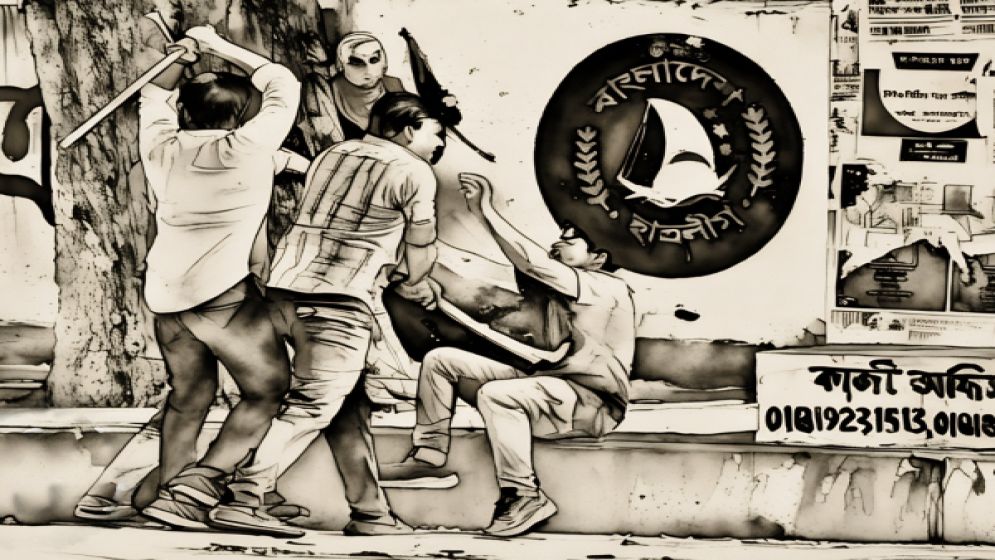Is Bangladesh Chhatra League a terrorist organization?

On Quora, a platform where users pose thought-provoking questions and engage in insightful discussions, one inquiry stands out: "Is the Bangladesh Chhatra League (BCL) a terrorist organization?"
Quora's unique nature, attracting users seeking in-depth knowledge and genuine curiosity, sets it apart from simple search engines. This raises the question of why such a query would appear on the platform.
While 33 responses from diverse individuals across the globe exist, none definitively label the BCL as a terrorist entity. The BCL, after all, is the student wing of the Awami League, a prominent political party with a significant historical role in Bangladesh's independence struggle.
However, delving into the BCL's Wikipedia page reveals a disturbing pattern. A significant portion of subheadings chronicle allegations of violence, harassment, and abuse, painting a grim picture of the organization's reputation. Separate Wikipedia entries dedicated to the "Violence of Bangladesh Chatra League'' further underscore this issue.
To an outsider, particularly a foreigner, online information about the BCL presents a disturbing paradox: a student organization with a history steeped in the nation's liberation struggle, yet marred by a long list of allegations involving violence, rape, and even murder.
However, for Bangladeshis, this is no longer shocking news. It has become an accepted, albeit deeply troubling, reality.
The BCL's descent has reached a new low. On Monday, members of the organization reportedly stormed into a hospital emergency room, brutally re-attacking students they had already injured hours earlier.
This incident underscores the harsh truth: the BCL has lost the respect of not only university students but also the general public who are aware of its actions. Its legacy has been tarnished, and its reputation is now synonymous with violence and brutality.
Even some of the leaders of BCL are ashamed of what the organization has become. A number of Dhaka University Chhatra League leaders and activists have resigned en masse to protest against what they call "inhuman" attacks on students involved in the quota reform movement.
From Monday night to Tuesday afternoon, prominent figures like Nurul Islam Hridoy, Jeba Saiyma, Sergeant Johurul Haque, and others announced their resignations on Facebook.
These resignations span various levels of leadership, including vice-presidents, deputy editors, and other key positions within the university's Chhatra League branch.
Juena Alam Mun, a leader of the BCL who has resigned, expressed on Facebook that she once viewed Chhatra League as “a defender of justice”. However, she now believes her “affiliation with the organization might be seen as a blemish on her close ties with her peers, seniors, and juniors.” “Hence, I am resigning from my position voluntarily and with full awareness,” she wrote.
Shah Sakib Sadman Pranto, another BCL leader also announced his resignation from the organization's executive committee on his Facebook page. He clarified that his decision was “made independently,” without any external pressure, and that he was “fully aware of the potential consequences.”
The resignations not only represent a strong condemnation of the violence against students but also probably signal growing dissent within the organization.
The student wings of the ruling party have long dominated university and college campuses in Bangladesh’s history, but the BCL has seemingly spiraled out of control during Sheikh Hasina's controversial four-term rule.
The repeated assaults on general students by BCL activists highlight the organization's growing disregard for the law and the inability of both campus authorities and law enforcement agencies to curb their violent behavior.
It is a widely perceived and understood fact that student politicians are meant to advocate for the welfare of the general student body, not become pawns for other interest groups.
However, the current reality is that BCL has monopolized student politics over the past 15 years, effectively becoming synonymous with it.
Their absolute control over public universities has allowed them to engage in various criminal activities with impunity, ranging from ragging and violence to extortion, seat trading, and even murder.
This has not only stifled the voices of ordinary students but also suffocated rival student organizations.
The problem is, despite frequently committing violent acts in plain sight, BCL members rarely face consequences from authorities.
In fact, university administrations often defend them even when evidence clearly implicates them, which is reprehensible. This inaction highlights a troubling lack of accountability for the organization's actions.
The failure of college and university administrations to control criminal activities by student and youth leaders affiliated with the governing political party has clearly exposed their partisan nature.
It is crucial for authorities to recognize their responsibility as educators and promptly take disciplinary and legal measures to eradicate the oppressive and violent culture perpetuated by Chhatra League on campuses.
They must ensure thorough investigations into allegations of violence and hold accountable those responsible, regardless of their party affiliation or political influence.
—
Harun Ur Rashid is a journalist and writer

